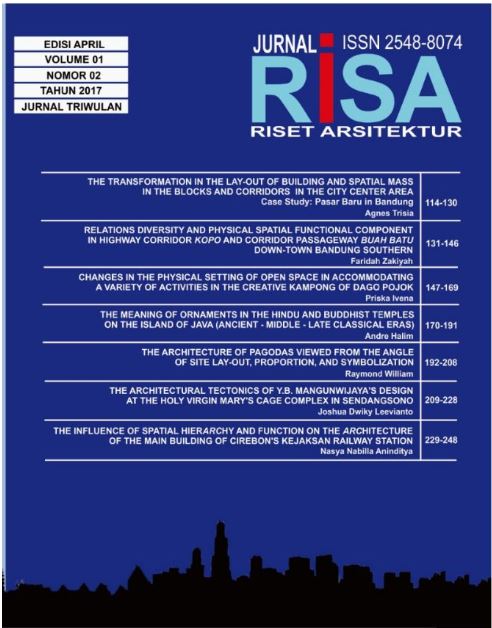THE ARCHITECTURAL TECTONICS OF Y.B. MANGUNWIJAYA’S DESIGN AT THE HOLY VIRGIN MARY’S CAGE COMPLEX IN SENDANGSONO
DOI:
https://doi.org/10.26593/risa.v1i02.2393.209-228Abstrak
Abstract - Apart from paying close attention to architecture as a constructional skill connected with material structure and construction, tectonics also covers its expression. One of the architects closely associated with tectonics is Y.B. Mangunwijaya, and in each of his works of architecture the tectonic content is put to the front or highlighted. Referring to Kenneth Frampton’s definition of tectonics as the Art of Joinings, it may be quite interesting to focus on the relationship between the three purposes to be found in a work of architecture, namely spatial distribution, construction, and ornamention.. One of the architectural works designed by Y.B. Mangunwijaya that has given shape to these three objectives is the Gua Maria Complex devoted to Mother Mary in Sendangsono. In Sendangsono there is a main route for pilgrims that is most commonly visited and passed by visitors to this sacred place. The analysis of architectural tectonics in this research study has been limited based on the ordering of the space passed via the main pilgrim route in Sendangsono. The spatial sequence consists of an entry, the Way of the Cross (Via Crucis), a basin for holy water, a yard featuring the Cave of Mother Mary (Gua Maria), and finally the yard across the river. Its scope includes the tectonics of space, structure, and ornamentation. The analysis indicates that the architectural tectonics in this complex has been designed with the concept of oneness and respect for nature in mind, so hat it has become one with the surrounding natural elements. The local materials used are environment-friendly. The next step is to further refine the elements used for this spatial and structural lay-out by way of ornamentation in order to enrich the Christian significance of it all.
Keywords: architecture, tectonics, Y.B. Mangunwijaya












